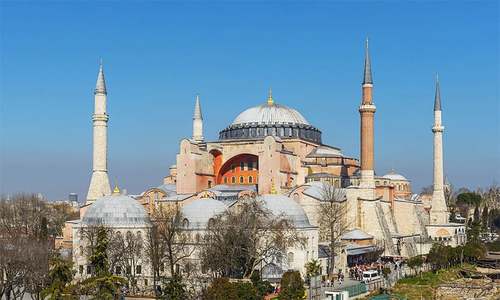ISTANBUL: President Recep Tayyip Erdogan on Saturday rejected worldwide condemnation over Turkey’s decision to convert the Byzantine-era monument Hagia Sophia back into a mosque, saying it represented his country’s will to use its “sovereign rights”.
Erdogan, who critics say is chipping away at the Muslim-majority country’s secular pillars, announced on Friday that Muslim prayers would begin on July 24 at the Unesco World Heritage site.
In the past, he has repeatedly called for the stunning building to be renamed as a mosque.
“Those who do not take a step against Islamophobia in their own countries ... attack Turkey’s will to use its sovereign rights,” Erdogan said during a ceremony he attended via video-conference.
A magnet for tourists worldwide, the Hagia Sophia was first constructed as a cathedral in the Christian Byzantine Empire but was converted into a mosque after the Ottoman conquest of Constantinople in 1453.
Erdogan’s announcement came after a top court cancelled a 1934 cabinet decision under modern Turkey’s secularising founder Mustafa Kemal Ataturk to preserve the church-turned-mosque as a museum.
The court ruled that “there are no provisions whatsoever in the convention (concerning the Protection of the World Cultural and Natural Heritage) that prevents ... the usage of the Hagia Sophia in accordance with domestic law.” Erdogan then signed a presidential decree handing the control of the “Hagia Sophia Mosque” to Turkey’s religious affairs directorate, Diyanet.
“We made this decision not looking at what others say but looking what our right is and what our nation wants, just like what we have done in Syria, in Libya and elsewhere,” the Turkish leader said.
Erdogan went ahead with the plan despite appeals from Nato ally the United States and from Russia, with which Ankara has forged close relations in recent years.
Greece swiftly condemned the move as a provocation, France deplored it while the United States also expressed disappointment.
Russia’s Deputy Foreign Minister Alexander Grushko said Moscow regretted the decision.
“The cathedral is on Turkey’s territory, but it is without question everybody’s heritage,” he told the Interfax news agency.
The influential bishop Hilarion, who heads the Russian Orthodox Church’s department for external church relations, also expressed his sorrow.
“It is a blow to global Christianity ... For us (Hagia Sophia) remains a cathedral dedicated to the Saviour,” he told state TV Rossiya24.
And the World Council of Churches, which represents 350 Christian churches, said it had written to Turkey’s president expressing their “grief and dismay”.
But Ozgur Unluhisarcikli, Ankara director of the German Marshall Fund, said the move would win hearts and minds at home as most Turks “would favour such a decision for religious or nationalist sentiments.
“This is a debate president Erdogan cannot lose and the opposition cannot win. As a matter of fact, this issue also has the potential to disunite the opposition parties.” Erdogan’s nationalist ally Devlet Bahceli welcomed the decision, saying that reopening Hagia Sophia to Muslim worship “has long been our desire.” After Friday’s decision, hundreds gathered outside the iconic building and performed evening prayers. On Saturday, police had put up barriers around the Hagia Sophia.
“We wanted to come and visit Istanbul and the Hagia Sophia museum but unfortunately we realised that from today it is closed,” said Renato Daleo, tourist from Italy.
Ksennia Bessonova, a Russian living in Istanbul flanked by her 16-month-old daughter and her husband, said they had also wanted to visit. “It was our little dream because since our daughter was born we were not able to come and here we go,” she said.
She hoped the authorities would not change anything inside.
“From what our friends and family were telling us it was something special and we wanted to feel the same. At the moment I am not sure what to expect but I feel sad in a way.” On Friday, Erdogan gave assurances that the Hagia Sophia would be open to all visitors, including non-Muslims.
“The Hagia Sophia’s doors will remain open to visitors from all around the world,” his press aide, Fahrettin Altun tweeted.
“People of all religious denominations are welcome and encouraged to visit it — just as they have been able to visit other mosques, including the Blue Mosque.”
Published in Dawn, July 12th, 2020















































